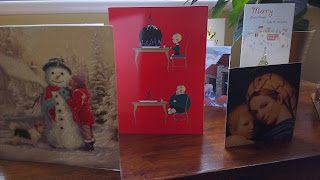It is that time of year again. I work myself to a standstill and then some old guy in a red suit takes all the credit. Worse still, I am complicit in perpetuating the lie. Thanks to my dishonesty, my son fervently believes Santa is up there with the superheroes.
I hate to bring feminism into this, but how can we ever achieve equality between the sexes when women bear the brunt of Operation Christmas?
Stockings √
Presents (includes wrapping and delivery) √
Christmas cards (includes post office queueing) √
Decorations √
Food shopping √
Cooking of Xmas lunch √
General list management √
Phew! And that's on top of normal life and all the other grey, nameless chores women accomplish in a working week. We are the unsung heroes of Christmas logistics.
Still, there is something contagious about the excitement building in our house. Letters to Santa are being penned and theories on how he manages to get round all of those homes in one night are being expounded. For the little people, Christmas is stupendous - a heady mix of magic, wakefulness and wish-fulfillment. I am not so jaundiced that I can't remember the heart-thumping thrill of Christmas Eve.
I just wish we stayed a little closer to the truth and called our festive superhero 'Mother Christmas'. Maybe kids would even believe in her existence for a little longer. Because let's face it - only a woman could juggle that many baubles and get home to cook the turkey.
Emma Clark Lam is the author of A Sister for Margot










